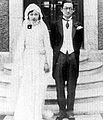Jin Yunying
| Aisin Gioro Yunying | |
|---|---|
Gūwalgiya Youlan |
| Jin Yunying | |
|---|---|
Hanyu Pinyin | Bǐnghào |
Yunying (1913–1992), better known as Jin Yunying, was a Chinese princess of
Names
Yunying's original family name was
Yunying's courtesy name, Ruixiu, was given to her by her father, Zaifeng. Her art name, Binghao, was given to her by her brother, Puyi. She is also sometimes referred to as Jin Ruixiu.
Reginald Johnston, the Scottish academic and diplomat who tutored Puyi, gave Yunying an English name, Lily.
Life
Early life
Yunying was born in the
Life in Manchuria

When Yunying turned 19, Puyi arranged for her to be married to
Later life
At the end of the Second Sino-Japanese War in 1945, Soviet forces invaded and occupied northeastern China. Yunying and the rest of Puyi's family were evacuated by train from Xinjing to Dalizigou (in present-day Linjiang, Jilin); Puyi, along with two of his sisters, his brothers, three nephews, his physician and a servant, took a plane to Mukden (present-day Shenyang, Liaoning), where he was arrested and taken to a prison camp in Siberia. Runqi was also taken prisoner and was not released until 1957. Yunying, left with only a few sets of clothing, brought her three children with her to Tonghua. During this time, she supported herself and her children by collecting and selling used clothes at a tobacco stand on the streets. During this time, she was taken captive and publicly interrogated about her life. She was released later and allowed to return to Tonghua.
In 1949, after Chinese Communist forces occupied
In 1954,
Yunying died in China in 1992. She was survived by her three children: Zongyan (宗弇), Zongguang (宗光) and Manruo (曼若). Her husband, Runqi was the owner of a small clinic that treated gynecological diseases and nervous disorders and was interviewed by The New York Times in 2000.[2] He died in 2007.
Relationship with Puyi
Yunying was described as beautiful and goodhearted. In his memoirs, Puyi described Yunying as spoiled and idle and interested in pointless matters during the Manchukuo period, foremost to be in his favour:[1] when he gave a gift to another member of the family, Yunying wished to be given the same.[1] According to Puyi, Yunying later said about this period in her life: "What was I before, but an ornament?"[1]
Ancestry
Youlan (1884–1921) | |||||||||||||||||||||||||||
| Linggui (1815–1885) | |||||||||||||||||||||||||||
| Lady Aisin Gioro | |||||||||||||||||||||||||||
| Lady Sun | |||||||||||||||||||||||||||
Gallery
-
Yunying and her son, Zongyan
-
Yunying and her husband, Runqi
-
Yunying with her husband, Runqi (seated), and her brother Pujie (standing)
Notes
References
- Puyi (Swedish): Jag var kejsare av Kina (I was the emperor of China) (1988)
- https://web.archive.org/web/20110927064301/http://www.lijiazhang.com/downloads/files/life_after_the_last_emperor.pdf
- https://web.archive.org/web/20100831103347/http://fineartimports.com/imperial.htm



